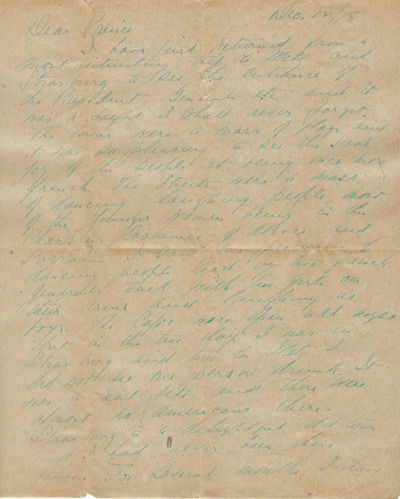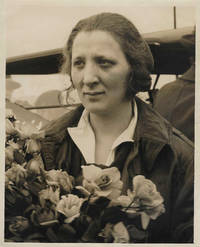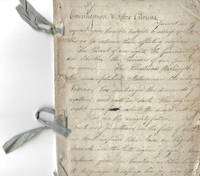by Halls, Major Morton
Quarto, 9 pages, plus original mailing envelope, formerly folded, in very good, clean and legible condition.
Major Halls writes describing his World War I career and the events surrounding the end of the war. Halls played a part in America's successful operations in September-November 1918 which brought about the end of the war. Halls went to France years before America officially entered the war. He served first in the ambulance service and later as commander of American forces serving with the French Commission Regulatrice Automobile, this unit was responsible for transporting troops and equipment to the front lines. He describes how he and his troops moved tens of thousands of troops in secret from St Mihiel after the Battle of St Mihiel in September 1918 to Sedan and the Meuse-Argonne. He describes the liberation of Strasbourg and Metz.
"Dear Prince,
I have just returned from a most interesting trip to Metz and Strasburg to see the entrance of the President, Generals etc and it was a sight I shall never forget. The towns were a mass of flags and it was so pleasing to see the real joy of the people at being once more French. The streets were a mass of dancing laughing people, most of the younger women being in the charming costumes of Alsace and Lorraine. I saw one procession of dancing people lead by two French generals each with two girls on their arms and laughing as boys. The Café's were open all night but in the two days I was in Strasburg and two in Metz I did not see one person drunk. It was a real fete and there were almost no Americans there. Strasberg is a delightful old town and I had never been there before. For several months I have been out of the Ambulance service and in Command of the American part of French C.R.A. (Commission Regulatrice Automobile) that was working lately with the 1st American Army. It is the organization that places, directs and executes the movement of troops by motor truck. To obtain this wisdom I first went to a French school. We moved by motor truck …by night and in secret 450000 men in nine days from St Mihiel to the Louelly Zone. I had 30 American officers and 75 french officers under me and 1500 men French and American not counting the drivers of the trucks. I was through the attack of the 1st Army in the Argonne at the end of September and on to Sedan in November. I have been proposed for the Croix de Guerre which I would rather have than be a general. I was also to be a Lt. Col but promotions were stopped when the Armistice was signed.
The way to get promotion seems to be to sit at a desk in Washington. Chisholm who never went to a training camp started the war by being made Capt and was doing artillery contracts in Washington. He was soon made Major and while we were in front of Sedan I received word from him that he had been made Lt Col. The letter I stuck in my pocket without reading in the morning as I was busy. I worked hard all day and was wet and very cold as it was freezing and my feet were wet. We had been working on the Road from Grandpre on to Sedan and at night found myself forced to sleep in a room with no windows as they had been shot away. From the windows one could see in the fields dead Americans, French and Bosch. It was a case of no bed and sleeping in my clothes in a chair in front of a fire, small & smoky. … I happened to think of the letter in my pocket and read it. He started by telling of his promotion and how hard they were working in Washington but the mention of an occasional trip to New York reminded me that I had not had an hour off for weeks and work never stopped until 2 a.m. … It was too funny to make me mad and instead of replying as Hotspur I read the letter aloud and the good laugh we had made us warmer. …
One of my officers here a Capt was twelve years Capt. In the N. G. of the State of Washington and Adj of his regiment. Over here he went to the staff school passed among the top and sent to the staff of the 1st Army and from there to us. He is still a Capt. They say over here if you go behind any Colonel and call Lieut. He jumps.
Since the Armistice our service has closed and I am now a liaison office with the French auto service at French G.H.Q. and very glad to be there.
My dear boy you are very foolish to worry at not being in uniform at the end of the war. You did what you thought was right and with the best intention which is all any one can do and what very few do. I am only waiting for my French decoration to come along to ask to get out. I want to go home and dig in the garden and would not stay a month longer in the army for any parade down the Champs Elysees. I have had over four years of it and am tired and my reason for going in it was to beat the Bosch at a time when my country thought otherwise. They are more than beaten now and the boys from the rear can rush to the front for all I care and parade all they wish. I want to wear a straw hat and flannels.
There was some doubt in my mind two years if we would come back to America to live or not. There is no doubt now and we and we have bought our place here and will rebuild after things settle.
Our men have been wonderful fighters Young and very fit and would be stopped by nothing. Some day I will tell you of many things I have seen. Most of my work with our Army has been with the staff and so I have been in a position to see many interesting things.
I am glad you are back home again as that is the place for any one not feeling fit. I hope to get leave for xmas. Elsie is in Paris and still working in the hospital but will stop very soon. They are sending people home from France as soon as possible and all but the regulars will be out soon. In the future you had better write me to my civil address
Villa Kerlia
Beuzec – Cong
Frinistri France
Letters will always be sent on to me if I am not there.
I hope Wilson's trip over here will do him a lot of good and Mrs W also but what she has to do with it I fail to see. I believe it a good idea for him to see for himself what a shelled town looks like and to see it first hand the damages done by the Hun. I have been up a road near Peronne where a village had been and there was nothing to show that a village had ever been there not a wall a foot high. The fields so torn by overtopping shell holes that I doubt if a man could ride a horse across the fields at that spot and I know he could not drive a cart. Montdidier where I was stationed in 1914 and the spring of 1915 is only a pile of bricks. We must not forget Miss Carill nor the Lusitania. A beaten bosch is still a bosch and will be for years. He can do many things well and these we can learn from him. His cities are clean and his rail roads are good but he is vulgar & coarse from the highest down. … Mort" (Inventory #: 31266)
Major Halls writes describing his World War I career and the events surrounding the end of the war. Halls played a part in America's successful operations in September-November 1918 which brought about the end of the war. Halls went to France years before America officially entered the war. He served first in the ambulance service and later as commander of American forces serving with the French Commission Regulatrice Automobile, this unit was responsible for transporting troops and equipment to the front lines. He describes how he and his troops moved tens of thousands of troops in secret from St Mihiel after the Battle of St Mihiel in September 1918 to Sedan and the Meuse-Argonne. He describes the liberation of Strasbourg and Metz.
"Dear Prince,
I have just returned from a most interesting trip to Metz and Strasburg to see the entrance of the President, Generals etc and it was a sight I shall never forget. The towns were a mass of flags and it was so pleasing to see the real joy of the people at being once more French. The streets were a mass of dancing laughing people, most of the younger women being in the charming costumes of Alsace and Lorraine. I saw one procession of dancing people lead by two French generals each with two girls on their arms and laughing as boys. The Café's were open all night but in the two days I was in Strasburg and two in Metz I did not see one person drunk. It was a real fete and there were almost no Americans there. Strasberg is a delightful old town and I had never been there before. For several months I have been out of the Ambulance service and in Command of the American part of French C.R.A. (Commission Regulatrice Automobile) that was working lately with the 1st American Army. It is the organization that places, directs and executes the movement of troops by motor truck. To obtain this wisdom I first went to a French school. We moved by motor truck …by night and in secret 450000 men in nine days from St Mihiel to the Louelly Zone. I had 30 American officers and 75 french officers under me and 1500 men French and American not counting the drivers of the trucks. I was through the attack of the 1st Army in the Argonne at the end of September and on to Sedan in November. I have been proposed for the Croix de Guerre which I would rather have than be a general. I was also to be a Lt. Col but promotions were stopped when the Armistice was signed.
The way to get promotion seems to be to sit at a desk in Washington. Chisholm who never went to a training camp started the war by being made Capt and was doing artillery contracts in Washington. He was soon made Major and while we were in front of Sedan I received word from him that he had been made Lt Col. The letter I stuck in my pocket without reading in the morning as I was busy. I worked hard all day and was wet and very cold as it was freezing and my feet were wet. We had been working on the Road from Grandpre on to Sedan and at night found myself forced to sleep in a room with no windows as they had been shot away. From the windows one could see in the fields dead Americans, French and Bosch. It was a case of no bed and sleeping in my clothes in a chair in front of a fire, small & smoky. … I happened to think of the letter in my pocket and read it. He started by telling of his promotion and how hard they were working in Washington but the mention of an occasional trip to New York reminded me that I had not had an hour off for weeks and work never stopped until 2 a.m. … It was too funny to make me mad and instead of replying as Hotspur I read the letter aloud and the good laugh we had made us warmer. …
One of my officers here a Capt was twelve years Capt. In the N. G. of the State of Washington and Adj of his regiment. Over here he went to the staff school passed among the top and sent to the staff of the 1st Army and from there to us. He is still a Capt. They say over here if you go behind any Colonel and call Lieut. He jumps.
Since the Armistice our service has closed and I am now a liaison office with the French auto service at French G.H.Q. and very glad to be there.
My dear boy you are very foolish to worry at not being in uniform at the end of the war. You did what you thought was right and with the best intention which is all any one can do and what very few do. I am only waiting for my French decoration to come along to ask to get out. I want to go home and dig in the garden and would not stay a month longer in the army for any parade down the Champs Elysees. I have had over four years of it and am tired and my reason for going in it was to beat the Bosch at a time when my country thought otherwise. They are more than beaten now and the boys from the rear can rush to the front for all I care and parade all they wish. I want to wear a straw hat and flannels.
There was some doubt in my mind two years if we would come back to America to live or not. There is no doubt now and we and we have bought our place here and will rebuild after things settle.
Our men have been wonderful fighters Young and very fit and would be stopped by nothing. Some day I will tell you of many things I have seen. Most of my work with our Army has been with the staff and so I have been in a position to see many interesting things.
I am glad you are back home again as that is the place for any one not feeling fit. I hope to get leave for xmas. Elsie is in Paris and still working in the hospital but will stop very soon. They are sending people home from France as soon as possible and all but the regulars will be out soon. In the future you had better write me to my civil address
Villa Kerlia
Beuzec – Cong
Frinistri France
Letters will always be sent on to me if I am not there.
I hope Wilson's trip over here will do him a lot of good and Mrs W also but what she has to do with it I fail to see. I believe it a good idea for him to see for himself what a shelled town looks like and to see it first hand the damages done by the Hun. I have been up a road near Peronne where a village had been and there was nothing to show that a village had ever been there not a wall a foot high. The fields so torn by overtopping shell holes that I doubt if a man could ride a horse across the fields at that spot and I know he could not drive a cart. Montdidier where I was stationed in 1914 and the spring of 1915 is only a pile of bricks. We must not forget Miss Carill nor the Lusitania. A beaten bosch is still a bosch and will be for years. He can do many things well and these we can learn from him. His cities are clean and his rail roads are good but he is vulgar & coarse from the highest down. … Mort" (Inventory #: 31266)


